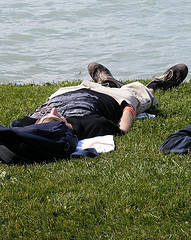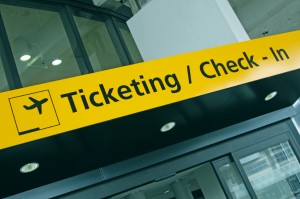 You’ve just finished your exams and it’s time to hit the big time. For three years your major in Philosophy has given you parties and lots of girls with glasses and a coffee habit. But now you’re graduating. There’s no job out there, and you kinda like the easy lifestyle so the best option is to go travelling to ‘find yourself’ or in other words, spend another year not doing much and burn out your parent’s credit card.
You’ve just finished your exams and it’s time to hit the big time. For three years your major in Philosophy has given you parties and lots of girls with glasses and a coffee habit. But now you’re graduating. There’s no job out there, and you kinda like the easy lifestyle so the best option is to go travelling to ‘find yourself’ or in other words, spend another year not doing much and burn out your parent’s credit card.
But, as you’ve spent the last three years with Michel de Montaigne, you don’t know how to do this. So, we’ve put together a handy post to give all you students and grads out there a chance to travel the world and have an excellent time doing it.
Couchsurfing.org
Credit crunch got to your trust fund as well? No fear, hook up with this excellent community and stay on couch’s through the world on your trip. You’ll meet lots of interesting people and you’ll also get to see how people really live. And it really saves on the bucks as well.
TripAdvisor
Even these days, the web is full of biased hotel reviews and destinations that are truly magical and amazing and are life changing. You then find out the only magic about the hotel is the one that is holding it up or that the customers have not died of dysentery after two nights of their food. Fortunately tripadvisor shows these problems with customer feedback reviews – what you really want.
DigiHitch
In the same way that couch surfing is for sleeping, digihitch is for hitchhiking. I know what you’re thinking: horror movie – stabbed in the outback and left for dead – but there is a whole community out there dedicated to hitch hiking – if this doesn’t make you feel safe, then you might as well stay in the basement!
Global Freeloaders
While the term ‘freeloader’ is defined as someone who takes advantage of the charity of others, this website has a way of bringing them together. The site is an online community of people offering free accommodations.
Expedia.co.uk
Like Tripadvisor, but European in outlook – you gonna want to go to Europe, right? With excellent hotel reviews and the added bonus of you being able to search for a car, hotel and flight together (well, if you’ve got loads of money and haven’t burnt out the credit card yet!).
 Apple.com
Apple.com
Travelling on the whole is boring. Getting there is the fun bit. The bit in-between is dull with long periods of sitting down and dozing – actually a perfect way to train you for an office job – but in the meantime you need some fun in your life. Got to Apple and download some tracks, podcasts, apps and games for your iPod. Can’t afford this level of tech? Sell some more blood or a kidney!
Travel.State.Gov
The most horrific that can happen to you on your holiday is when you lose your passport – luckily the US State Department can give you all the advice you need and will hopefully help you when it all goes wrong. They may however, just lock you up, throw you in an orange jump suit and give you an extended stay in Cuba.
Weather.com
A great weather service that tells you all the information you need to know about the weather. Strangely!
 Ecotravelling.co.uk
Ecotravelling.co.uk
So you want to travel the world but you want to do it with the minimum of impact to the environment? You’ll need help – fortunately this blog is packed to the mulched rafters with advice and hints and tips on eco-friendly travel.
Amazon Kindle Store
Don’t lug all your books around the world – that mean that you’ll only be able to wear one pair of underwear through the whole trip. A kindle, with connection to their store means you can read a whole library on your techhie wonder all in a rather grey and rather lacklustre design. But it’s worth the 15 days working in the cracker factory with Jose.
Hostels.com
Youth Hostels are a great place to hang out in. But be aware! You want to go to the recognised hostels, not just any old thing. This site tells you all about the right ones – and there’s a great forum added in to boot.
IWantOneOfThose.com
Travelling’s all about showing off the right gadgets – the Apple Tablet, a $14,000 camera(and lenses) and a proper diving watch. But those things are a bit passé, aren’t they? Get yourself some really funky travel gadgets, and be the envy of your hostel.
 SleepingInAirports.net
SleepingInAirports.net
Hilarious and informative at the same time. Picture the scene. You’re in France. You’re exhausted and you can’t afford a hostel and there are no friends to couch surf with. You have two choices, sleep in Charles De Gaulle’s airport of sleep rough. Sleepinginairports will tell you which one to choose and, the best places to sleep. Invaluable for the weary traveller. Or for the not so weary traveller having a laugh.
Travel-Rants.com
Wanna complain about something on your trip? Chances are, Travel Rants may have got there first. A great blog for checking in and making you feel that it’s not just you asking the question, “is it just me?â€
FoodByCountry.com
Are you lactose intolerant? Allergic to ethnic food? Check this site out. You can see famous recipes from any country you like so you can see what you like and what might kill you, helping you not cause offence to the lovely inn keeper who’s just given you Teh Halia
Twitter
Don’t you roll your eyes at the back! It’s not just a place for people to tell you they’ve just gone to the Washroom – it’s a way you can keep family and friends up to date with where you are and what’s going on. Oh, and what the washrooms are like in Vietnam.

 1. Buying a travel insurance policy after something happens: Travel insurance, like all insurance, is meant to cover sudden and unforeseen events. In order to be covered, you need to have purchased the insurance before the unforeseen events. Many travelers wait until something happens, then purchase a policy. Unfortunately, those claims are not covered.
1. Buying a travel insurance policy after something happens: Travel insurance, like all insurance, is meant to cover sudden and unforeseen events. In order to be covered, you need to have purchased the insurance before the unforeseen events. Many travelers wait until something happens, then purchase a policy. Unfortunately, those claims are not covered. Wyomissing, Pa., December 29, 2008 — Beginning January 1, 2009,
Wyomissing, Pa., December 29, 2008 — Beginning January 1, 2009,  Travel can be very expensive and many travel products are non-refundable. Travel cancellation insurance coverage can reimburse the cost of your pre-paid trip expenses, but not all travel insurance plans include this coverage. Once you’ve paid your trip deposit (or even the full amount), any number of unexpected reasons can cause you to have to cancel your trip. Canceling your trip can cause you to lose some or all of your prepaid travel expenses, and many travelers find that travel cancellation coverage is well worth the cost.
Travel can be very expensive and many travel products are non-refundable. Travel cancellation insurance coverage can reimburse the cost of your pre-paid trip expenses, but not all travel insurance plans include this coverage. Once you’ve paid your trip deposit (or even the full amount), any number of unexpected reasons can cause you to have to cancel your trip. Canceling your trip can cause you to lose some or all of your prepaid travel expenses, and many travelers find that travel cancellation coverage is well worth the cost. Backpacking in Colorado means high altitudes (the Rocky Mountains!), significant weather exposure (freezing temperatures!), and some of the most memorably beautiful views you can ever imagine. Exploring the trails of Colorado or hiking the many 14,000 foot peaks (
Backpacking in Colorado means high altitudes (the Rocky Mountains!), significant weather exposure (freezing temperatures!), and some of the most memorably beautiful views you can ever imagine. Exploring the trails of Colorado or hiking the many 14,000 foot peaks ( Exotic ports of call, resplendent cruise ships, vacationing with all the bells and whistles – finally! Traveling the world in a beautiful cruise ship with a well-appointed room and a constantly changing views can be very exciting.
Exotic ports of call, resplendent cruise ships, vacationing with all the bells and whistles – finally! Traveling the world in a beautiful cruise ship with a well-appointed room and a constantly changing views can be very exciting. Many cruise lines have been getting into the travel insurance business and offering travel insurance packages that can be purchased when you book your cruise. There are also many independent insurance companies that offer coverage that can be purchased — typically within 10 or 15 days of your initial trip deposit — but there are some important points to understand before you choose your travel plan.
Many cruise lines have been getting into the travel insurance business and offering travel insurance packages that can be purchased when you book your cruise. There are also many independent insurance companies that offer coverage that can be purchased — typically within 10 or 15 days of your initial trip deposit — but there are some important points to understand before you choose your travel plan. Travel insurance companies now provide annual travel insurance for people who have to travel often throughout the year, but don’t always have the time to sign up for a travel insurance plan before they have to leave. Travelers who need annual coverage may be business travelers, leisure travelers, even medical travelers – anyone who travels often and usually unexpectedly throughout the year.
Travel insurance companies now provide annual travel insurance for people who have to travel often throughout the year, but don’t always have the time to sign up for a travel insurance plan before they have to leave. Travelers who need annual coverage may be business travelers, leisure travelers, even medical travelers – anyone who travels often and usually unexpectedly throughout the year.